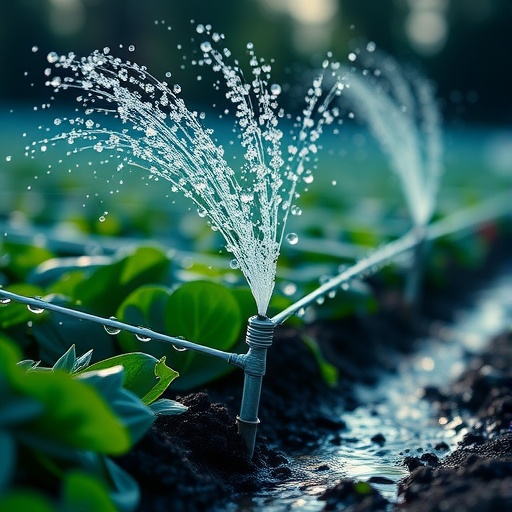In recent years, the interplay between artificial intelligence (AI) and environmental sustainability has garnered immense attention, particularly in the realm of water quality assessment. A study titled “Towards efficient artificial intelligence techniques for the assessment of irrigation water quality: a systematic literature review,” led by researchers Mustapha, Zineddine, and Abdulganiyu, offers a comprehensive examination of how AI can be employed to enhance the evaluation of irrigation water. This systematic review, published in Environmental Science and Pollution Research, outlines the existing methodologies while highlighting the potential for improved practices in agricultural water management.
Irrigation, a vital component of agricultural productivity, often relies on water quality to ensure healthy crop growth. Contaminated irrigation water can lead to adverse effects on both crop yield and surrounding ecosystems. Therefore, the need for accurate and timely assessment of water quality is paramount. The review posits that traditional methods, while useful, often fall short in speed and scalability. This gap presents a unique opportunity for the integration of AI technologies, which can process vast amounts of data far more efficiently than conventional methods.
One of the key advantages of AI in this context is its ability to analyze complex datasets generated from various sources, including remote sensing, sensor networks, and environmental monitoring systems. By employing machine learning algorithms, AI can identify patterns and anomalies that may not be readily apparent through traditional analysis. This capability is particularly crucial in dealing with the multifaceted factors influencing water quality, such as chemical composition, biological activity, and physical parameters.
The study focuses on the various AI techniques that have been employed in existing research. Techniques such as supervised learning, unsupervised learning, and deep learning are examined, revealing their applicability in predicting water quality parameters like pH, turbidity, and nutrient levels. These techniques not only enhance predictive accuracy but also reduce the time and resources needed for water quality testing, making them attractive alternatives for farmers and policymakers alike.
Moreover, the review discusses challenges associated with the implementation of AI technologies in this field. Despite the promising potential, barriers such as data quality, algorithm transparency, and the interpretability of AI models remain significant hurdles. Furthermore, the balance between automation and human oversight is a critical consideration, as reliance solely on AI could lead to oversight in nuanced environmental contexts.
The researchers argue that addressing these challenges requires a multidisciplinary approach, integrating insights from environmental science, engineering, computer science, and agricultural studies. Collaboration among these fields can foster the development of robust AI frameworks tailored to the unique challenges of water quality assessment. Furthermore, public policy should encourage research funding and the establishment of guidelines for the ethical use of AI in environmental monitoring.
In exploring future directions, the study emphasizes the importance of real-time monitoring systems combined with AI capabilities. The advent of the Internet of Things (IoT) has paved the way for smart irrigation systems that can assess water quality in real time, providing immediate feedback to farmers. This proactive approach not only ensures optimal irrigation practices but also promotes sustainable water use, crucial in an era marked by climate change and water scarcity.
The environmental implications of utilizing AI for irrigation water quality assessment are profound. As agricultural practices evolve to be more data-driven, the potential for enhanced crop productivity and reduced environmental impacts becomes more attainable. The ability to monitor and manage water quality effectively aligns with broader goals of biodiversity conservation and ecosystem health.
Furthermore, the systematic review sheds light on the global disparity in AI adoption across agricultural practices. While some regions have embraced these technological advancements, others lag due to lack of access to necessary infrastructure or expertise. Bridging this gap is essential not only for equity in agricultural productivity but also for addressing global food security concerns.
In conclusion, the systematic literature review underscores the transformative potential of artificial intelligence in the assessment of irrigation water quality. As the challenges of sustainable agriculture become increasingly complex, the integration of AI emerges as a critical tool. Continuous research and collaboration among diverse disciplines will be vital in maximizing the potential of these technologies to foster sustainable agricultural practices.
Ultimately, the findings call for urgent action from stakeholders, including government agencies, agricultural organizations, and technology developers, to prioritize the development and implementation of AI-driven solutions in water quality assessment. Ensuring the health of irrigation water is not only a prerequisite for agricultural success but also an imperative step toward ensuring environmental sustainability for future generations.
Subject of Research: Artificial intelligence applications in irrigation water quality assessment.
Article Title: Towards efficient artificial intelligence techniques for the assessment of irrigation water quality: a systematic literature review.
Article References: Mustapha, M., Zineddine, M., Abdulganiyu, O.H. et al. Towards efficient artificial intelligence techniques for the assessment of irrigation water quality: a systematic literature review. Environ Sci Pollut Res (2025). https://doi.org/10.1007/s11356-025-37137-1
Image Credits: AI Generated
DOI: https://doi.org/10.1007/s11356-025-37137-1
Keywords: Artificial intelligence, irrigation water quality, machine learning, environmental sustainability, agricultural practices.




